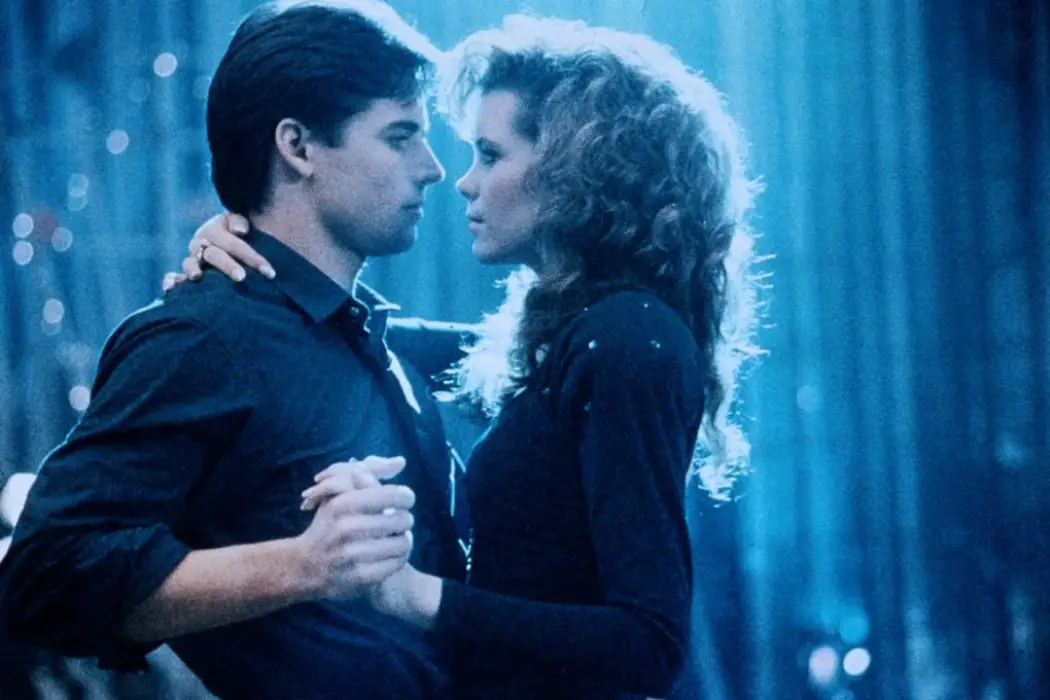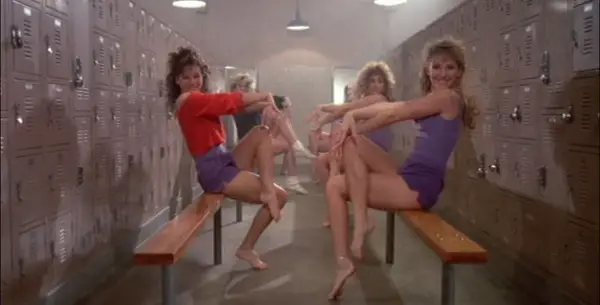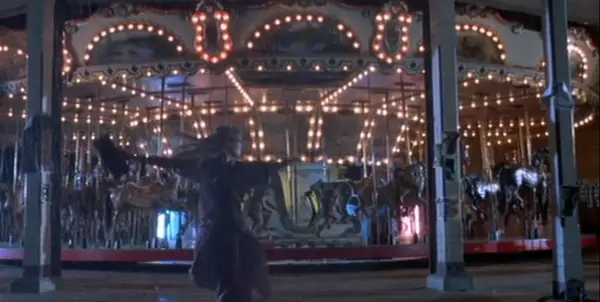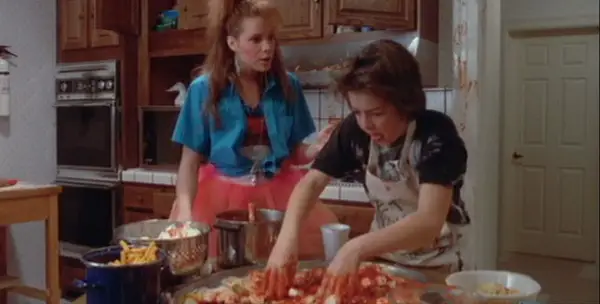Trash Caviar: The Accidental Magic Of TEEN WITCH

Julian is a playwright/movie-lover in New York City. He feels…
Allow me, if you will, to take you on a journey.
It’s 2:23 AM on August 8th, 1988, and the mountain of cocaine on two writers’ desk is rapidly shrinking. It’s hot as hell in LA. They’ve been up for almost thirty hours wracking their brains for a marketable idea to save their fledgling company. They don’t know if it’s the blow or the stress, or the massive loss of fluids, but as they near the edge of consciousness, approaching a state of hyperawareness, they lock eyes and simultaneously, as though a single voice was speaking through them, say:
“Teen Wolf…Be-witched…Teen…WITCH! Hot damn, Vern, we’ve done it again!”
A few miles down the 101, a minor Hollywood producer wakes with a start. It’s not his enlarged prostate this time. Nor is it the raccoon who visits nightly to knock over the trash cans and whisper ominous threats to his children. It’s a dream that shakes him from his slumber. Of songs, of hunks, of magical girls.
Far up in the Beverly Hills, a young actor lays in bed. The son of a Pulitzer prize-winning playwright and a Playboy pin-up model mother, his blood pulses with potential energy. And yet he sleeps. After all, he is only thirteen. He sleeps deeply, contentedly, stoically. He does not know it, but his moment is about to arrive.
80s Camp Ridiculousness
Now that you have read my satirical (and thus legally non-libelous) origin story, I suppose I ought to explain what I’m talking about: Teen Witch.
If you are someone with any love of campy 80s cinema, you will know within the first thirty seconds of Teen Witch that you are in for a treat. Like all good “bad” movies, we like it because it’s endlessly surprising. It’s uncanny. On one level, it’s so familiar that it feels “derivative”, but there are these little idiosyncrasies, these small screaming moments of pure weirdness, that keep me coming back like a deer to an opioid salt-lick.
Unlike many cult “so-bad-its-good” hits, this isn’t the accidental masterpiece of a single auteur. There is no Tommy Wiseau or Neil Breen behind this movie laying bare his alien psyche. Simply put, Teen Witch is the product of the Hollywood grind house. It was produced cheaply in 1989 and released to little fanfare, leaving theaters after only seven days and $27,843 in box office receipts. However, in the years since it has firmly entrenched its status as a cult classic.
Basic Story: “Give Me The Same, But Different”
On the surface this movie is like a thousand other teen movies with a slight magical twist: An unpopular girl pines after the coolest guy in school, who doesn’t even know she exists. On her sixteen birthday, she discovers she’s a witch and her luck changes. Using magic, she gets back at those who wronged her, and makes herself the popular girl she has always wished she could be. After ninety minutes of ups and downs she realizes that the true magic – the magic of believing in yourself – was inside her the whole time.
Oh–did I mention it’s a musical?

It would not be an outright lie if I left it at that. But there’s another layer to it.
Ok, ok I admit it: I can neither confirm nor deny the extent of the screenwriter’s cocaine use. I can, however, make the reader aware of two things:
1) It was 1989 and cocaine in Los Angeles was as cheap, pure, and plentiful as it had ever been.
2) There is deeply cynical undertone to this movie which betrays a nearly paranoid lack of faith in authority normally seen at the end of a three-day uppers binge.
It’s possible that was intentional, that before the producers and director had their way, this was a different movie. There are the bones of a darker, more socially satirical film than the one ultimately cut together; something closer to Heathers or Harold and Maude than to Ferris Bueller or Sixteen Candles.
Poor Louise
Even by the standards of teen movies, which nearly always have a protagonist whose life, like, TOTALLY sucks, the main character of Louise is unusually put-upon. She is the subject of universal derision from her peers and frequent humiliation by her teacher.
It is common for protagonists to be outcasts, or loners. But there’s usually someone watching out for them, helping them stay true to themselves when the woes of teen life become too much: Andie’s manager at the record store in Pretty in Pink, Mitch’s older sister in Dazed and Confused, Cady’s math teacher in Mean Girls. The list goes on. It’s practically an immutable truth of teen movies.
Except, of course, in Teen Witch.
A pedantic reader will remind me that Louise does have “friendly” authority figures. I will concede to the reader that Louise has figures which ought to be the purveyors friendly authority, but I will remind them that these figures are in fact hot garbage who are either painfully negligent or flagrantly manipulative, and all make Louise’s life much worse.
Her parents are unhelpful, but that’s not atypical for a teen movie. Louise could have a full-on breakdown at the dinner table – stammering between sobs that she sometimes thinks about killing herself – and her mother would just smile, nod, and ask if she wants some more string bean casserole. During one of Louise’s low points of the movie, her father comforts her by reminding Louise that her mother, too, was ugly at age sixteen. It gets better, Louise!
The drama teacher, Ms. Molloy, with whom Louise supposedly has a close and special relationship, won’t even cast her in the high school play. When Louise tries to open up, Ms. Molloy ignores her outright or responds with thoughtless unhelpful platitudes.

After Louise uses her powers to help Ms. Molloy win the lottery and the affections of a handsome stranger, Ms. Molloy literally leaves town and doesn’t look back. Louise might have known better, but it was 1989 – the mantra “no fake friends” had not been invented.
The most egregious offender of all is Louise’s supposed mentor witch, Serena. Serena wastes no time in revealing herself as a petty grifter and a charlatan. In her very first scene, she tries to con Louise – who, I should add, is delirious after having just been run off the road by a car – into giving up her last ten dollars for a palm reading. After discovering Louise’s witch-hood, Serena’s first test of her powers is to get her to conjure a stack of twenty-dollar bills. Louise succeeds. Serena, with a glint in her eye, asks if she wants to try hundreds.
An understandably weirded out Louise runs out and Serena panics. It seems that she needs Louise’s youthful powers. She is overjoyed when Louise comes back and asks if, through magic, she can make a boy love her. Serena shoots back an excited reply without a hint of irony. “Are you kidding? With me as your coach, he’s gonna become your love slave!” she exclaims.
Serena helps her, but not before enlisting Louise’ help to (unbeknownst to Louise) turn a toad into an obedient human sex doll. By any normal measure, she is a rapacious sex-monster. She certainly offers no helpful guidance, and her spells create many more problems than they solve. She initially refuses even to undo the mess she’s created, despite Louise’s pleading:
LOUISE: I’m not happy, ok!
SERENA: Who is happy? You’ll get used to it.
Oof.
Every time Louise looks to someone else for help she is ignored, misled, or betrayed. She is taught rather painfully that no one can be trusted, and that all of her problems are hers and hers alone. It’s a cold and unfamiliar shot of cynicism in a genre where the power of love and friendship usually conquer all.
Source Of The Cynicism
Surviving High School isn’t easy in Teen Witch, especially if you are a woman. At various times it begins to grapple with some of the complicated realities of being a high school girl. Early on, Louise’s best friend Polly prudishly shames other girls for their revealing clothes, then just a few scenes later is jealous of Louise being asked to the school dance. Louise’s date is a creep who later tries to sexually assault her, “but still”, Polly says “at least you aren’t here alone”.
These are all facts nested in the script. They are not implied through framing or lighting. They are not suggested through subtle performance.

As I mentioned previously, it’s possible that this was all intentional, that we are noticing the dark lining of the movie that the writers wanted to make. It’s also possible that it was an act of accidental psychoanalytic transference – Robin Menken and Vernon Zimmerman unknowingly sublimated their biases and cynicism when they simply wanted to write a fun teen movie.
The writers had plenty of reasons to be cynical. Menken was openly – and understandably – bitter about the role of women in Hollywood, as well as her betrayal at the hand of her former writing partner (she was hit by a car and while she was hospitalized he took their scripts and tried to sell them as solo projects).
The 1980s as a whole was a period of disillusionment. Wracked by scandals like the Iran Contra affair, humanitarian crises like the AIDS epidemic, and general atmospheres of austerity, many people lost confidence in our leaders’ ability to protect us. Existential anxieties wormed their way into our collective unconscious and sublimated into our pop culture. Questions were raised:
How do we navigate young adulthood when there’s no one we can really trust?
Why do we simultaneously covet and shame female sexuality?
Is their really liberty and justice for all, or only the singing and dancing popular girls?
Dyeing The Dark Roots
To the great benefit of the movie-watching public, the other players involved in the making of Teen Witch were unconcerned with such questions.
The executive producer was less concerned with making art than churning out trend-exploiting genre flicks, getting them in theaters for seven days, then shipping them off to the international markets where hopefully someone gets confused and thinks The Further Adventures of Tennessee Buck is actually the latest Indiana Jones movie .
Dorian Walker is a competent director, but he and the writers undeniably had a conflict of vision. He claimed the script “sang” to him as he read it, and it was at his behest that Teen Witch became a musical. Together with the producer he removed more than fifteen pages of the original script. So while we see these little glimpses of something more, the door slams shut as soon as it opens. The result is hilarious. It’s like if in Get Out, after Lakeith Stanfield’s titular outburst, it cut to a surf pop dance number and played out the remaining sixty minutes as a slapstick fish-out-water rom-com.
I don’t want to rag on Walker too much without at least recognizing what he did right. Frame for frame, the movie does an excellent job of executing on the visual style of the teen movies it’s trying to replicate. It has a warm color palate with the boosted red, white, and blues seen in every John Hughes movie. The camera work in Louise’s audition scene is particularly elegant, slowly circling around Brad and Louise while she “seduces” him as part of their play. Later, we see Louise dancing in the pouring rain while a beautiful carousel flashes and spins.
The songs, while idiosyncratic, are actually a lot of fun. “Top That” is beloved in the internet meme-world, and has been parodied in shows like 30 Rock. More than once in the past few weeks, I’ve caught myself humming the tune.

Because Walker was locked into his vision, he didn’t understand how jarring and out of place some of his choices were with the darker elements of the underlying script. Louise’s teacher cruelly humiliates her in front of the class, and immediately afterward there’s an extended cheer-pop dance to a song called “I like Boys”. Her date tries to sexually assault her, then we cut to a screwball-y scene where she turns her younger brother Ritchie into a dog.
Over and over and over again, Walker bulldozes over or simply ignores the array of eyebrow-raising details in pursuit of his happy ending.
The Unexamined Brad Is Not Worth Dating
But is it really a happy ending? It follows the conventions, at least: two young coeds overcoming their differences and sealing their fates with a kiss on the dance floor. Louise, our bright-eyed young heroine, has finally obtained her object of desire.
And what a desirable object he is.
He’s rich. He’s a football star. He’s the star of the school play. Not because he’s the best actor, but because everyone around him can taste the pheromones dripping off his body, and they know he’s got that magical star juice that puts asses in seats.
Walker lovingly shoots Brad’s body, zooming in on his greased-up muscly torso as he dips deep into pushups, then cutting quickly to him throwing a football powerfully through a car tire as a reminder that Brad f*cks and Brad f*cks good.
Brad is also a scumbag. In the first ten minutes, he nearly runs over Louise with his car while implicitly receiving road head from his girlfriend. After the first school dance scene, he gives the obviously drunk rapist-cousin his car keys to drive Louise home. Why? Because he wants to go party at his buddy’s house. Throughout the movie he cheats on his girlfriend with Louise, then on Louise with his girlfriend, without ever paying lip service to the fact that there are multiple women in his life who presumably expect him to be faithful.
There’s a wonderful (and presumably accidental) visual metaphor for the tone of the movie about 75 minutes in when Brad – I kid you not – drives Louise to an abandoned house to take her virginity.
It is dilapidated and creepy as shit, the bright yellow sunflowers a thin veneer over the rot hidden behind them. There is an element of beauty in the foreground, sure, but lurking behind is something sinister. Is…Louise going to be ok? She follows Brad inside and Walker assuages our fears by playing saxophone music ripped straight from a porn movie. “Don’t worry, folks. It’s a happy scene.”
Walker never holds Brad accountable or offers any consequences for his many failings. When they share their final kiss and the credits roll and the porno saxophone music plays once again, we are supposed to believe that all in the world is right and good.
A Cinematic Frankenstein
I would be remiss if I failed to mention the younger brother, Richie, played by the inimitable Joshua Miller. If the writers gave this Franken-movie a brain, the director gave a heart, and the composer and producers sewed together the misshapen limbs, it is the young Mr. Miller who adds the 10,000 volts which makes the story come alive.

On one hand he’s a very familiar figure. The annoying younger brother. The bratty half-pint. And though some of the pure insanity of this character I’m sure came from the script and direction (for example: in the first scene we meet him, he is hiding under Louise’s bed while she sleeps devouring a chocolate cake by himself), it is his own choices that elevate the role and the movie to the next level.
This is not conjecture. I know that it was not the director who dragged this performance out of him because behavior that unhinged cannot be coached. It would be truer to chalk it up to genetics.
He comes from a three-Wikipedia-generation family. His father was a nationally renowned playwright (and the hot young priest from The Exorcist), his mother was a playboy model, and his grandfather was a famous photographer who essentially invented the pinup . Miller stared into the void of the immense shoes he would have to fill, and the void stared back into him.
How would he know if people really liked him? How would he know if he really had talent when his connections meant he would always be able to find a job somewhere?
The conflict raging within Miller is the same conflict threading through the movie. He draws on this. He invokes the spirit of all his doubts, all his anxieties, and channels them in the Nouveau Shamanic style of Nicolas Cage. He lets them take him over—become him. It is the embodiment of Teen Angst itself that controls his limbs as he inexplicably plays a sauce-covered pizza crust like an organ.
It is the voice of every toxic, embittered mother in history that courses through him every time he tears Louise down, telling her in his vaguely New York teamster accent that “No one will ever date you because you’re a dog…A dog!”
In Conclusion: Accidental Magic
This movie is so many amusing and often contradictory things. Attempting to arrive at a single unified understanding of it is a bit like trying to find the ceiling in an MC Escher painting, or reading an angry Yelp review that has been repeatedly looped through an online translator. But it’s precisely this lack of unity that makes the film such a delight to watch.
Teen Witch is the disillusioned Gen-Xer and the Boomer ad executive trying to sell them cars
Teen Witch is the atheist that inadvertently proves the existence of God
Teen Witch is on both sides of the porn wars.
A happy accident spit out the low-budget Hollywood Rube Goldberg machine, it is compelling in a way that no individual person could pull off on their own. Had any of the primary creators been on the same page we would probably never have been gifted this peculiar little gem. Some people might call that luck. I’d prefer to call it magic.
Does content like this matter to you?
Become a Member and support film journalism. Unlock access to all of Film Inquiry`s great articles. Join a community of like-minded readers who are passionate about cinema - get access to our private members Network, give back to independent filmmakers, and more.
Julian is a playwright/movie-lover in New York City. He feels very strongly that anyone who didn’t ugly cry while watching Paddington 2 is probably a robot.












